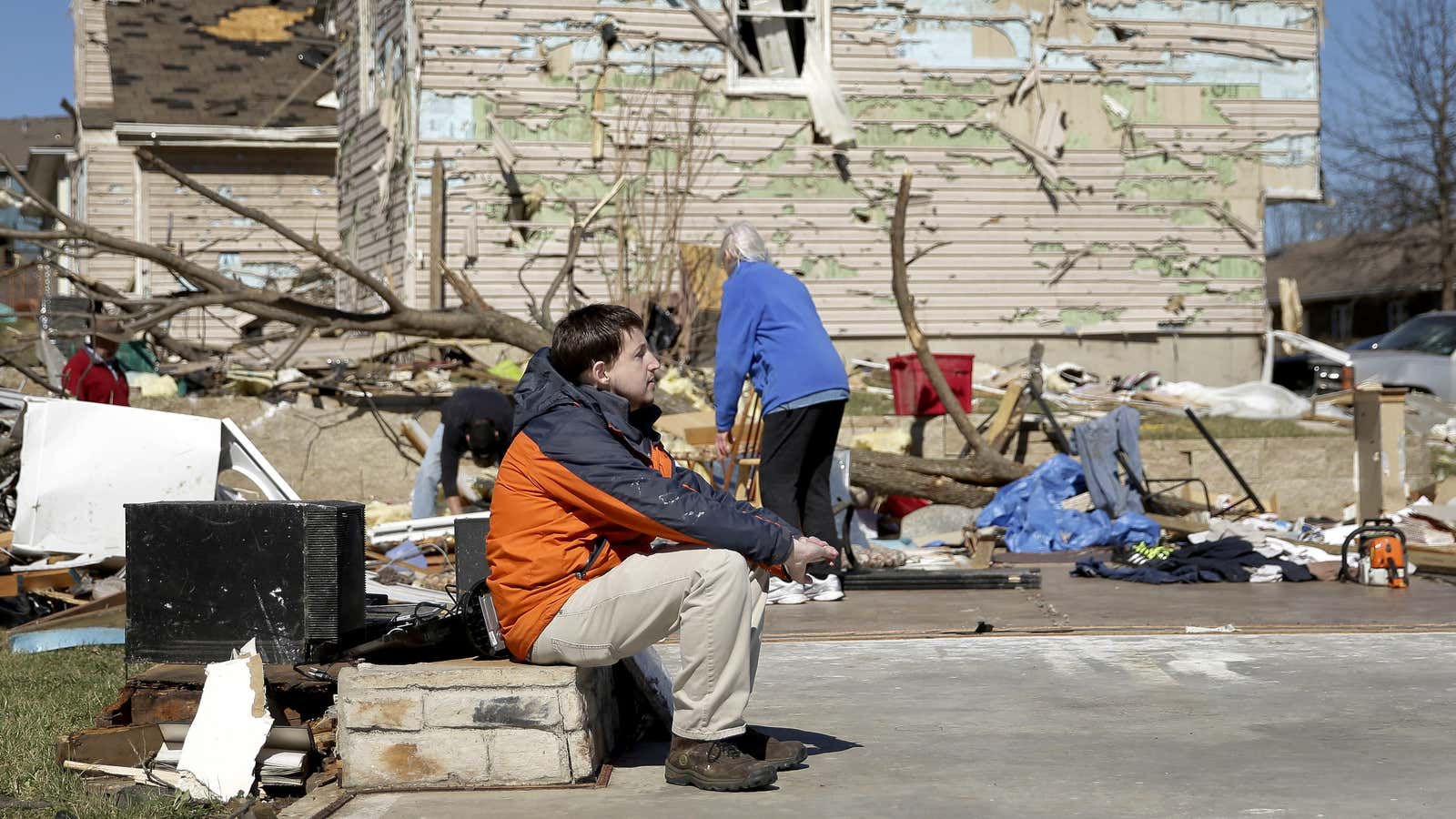Depression, anxiety, grief, despair, stress—even suicide: The damage of unfolding climate change isn’t only counted in water shortages and wildfires, it’s likely eroding mental health on a mass scale, too, reports the American Psychological Association, the preeminent organization of American mental health professionals.
Direct, acute experience with a changing climate—the trauma of losing a home or a loved one to a flood or hurricane, for example—can bring mental health consequences that are sudden and severe. After Hurricane Katrina, for example, suicide and suicidal ideation among residents of areas affected by the disaster more than doubled according to a paper led by Harvard Medical School, while one in six met the criteria for PTSD, according to a Columbia University-led paper. Elevated PTSD levels have also been found among people who live through wildfires and extreme storms, sometimes lasting several years.
But slower disasters like the “unrelenting day-by-day despair” of a prolonged drought, or more insidious changes like food shortages, rising sea levels, and the gradual loss of natural environments, will “cause some of the most resounding chronic psychological consequences,” the APA writes in its 69-page review of existing scientific literature, co-authored by Climate for Health and EcoAmerica, both environmental organizations. “Gradual, long-term changes in climate can also surface a number of different emotions, including fear, anger, feelings of powerlessness, or exhaustion.”
Moreover, when a person is under chronic stress, their levels of the “stress hormone” cortisol increases. Over long periods of time, chronic stress has been shown to suppress the immune system, “leaving people more vulnerable to pathogens in the air and water,” the researchers write. In other words, mental health is intimately linked with physical health, and prolonged despair can lead to disease.
More often than not, people with low incomes, people of color, and indigenous people will feel these impacts first, and in many cases, already are, the APA writes. “The impacts of climate change are not distributed equally,” it found in its review of the scientific literature.
There’s a litany of mental health conditions linked to directly experiencing the impacts of climate change—whether acute or chronic—according to the APA:
- trauma and shock
- PTSD
- compounded stress
- strains on social relationships
- depression
- anxiety
- suicide
- substance abuse
- aggression and violence
- loss of autonomy and control
- loss of personal and occupational identity
- feelings of helplessness, fear, and fatalism
For people not yet living directly in the path of climate change, mental health problems can also be triggered indirectly, from “watching the slow and seemingly irrevocable impacts of climate change unfold, and worrying about the future for oneself, children, and later generations.” Such existential anxiety, in other words, can touch anyone grappling with the larger-than-life impacts of a warming planet. Psychologists and researchers are beginning to call this condition “ecoanxiety,” a term that’s been popping up in research papers in recent years.
Some people “are deeply affected by feelings of loss, helplessness, and frustration due to their inability to feel like they are making a difference in stopping climate change,” writes the APA. “Some writers [of research papers] stress the possible detrimental impact of guilt, as people contemplate the impact of their own behavior on future generations.”
Treating patients for psychological distress about a changing environment is not exactly new—but it is niche. In 2011, a New York Times article highlighted an organization called the International Community for Ecopsychology, which currently has a modest directory of 31 therapists specializing in environment-related distress. At the time, a spokesperson for the American Psychological Association told the paper the APA was neutral towards the new field, but was “certainly watching it.”
Now the APA is throwing its full weight behind it, urging broad recognition of the connection between mental health and climate change: That the changing environment is a legitimate source of distress already affecting many people, and it has the potential to be psychologically destabilizing.
“To compound the issue, the psychological responses to climate change, such as conflict avoidance, fatalism, fear, helplessness, and resignation are growing,” the APA notes. “These responses are keeping us, and our nation, from properly addressing the core causes of and solutions for our changing climate, and from building and supporting psychological resiliency.”
